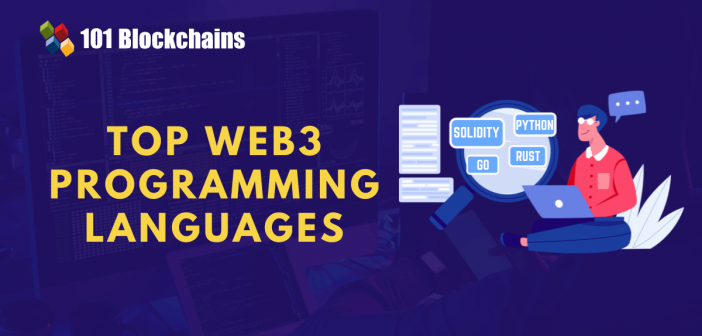Learn how blockchain truly works, master key definitions, and uncover what makes smart contracts so "smart." Dive into the fundamentals, gain valuable insights, and start your blockchain journey today!

Web3
James Howell
on October 07, 2022
List of Top Web3 Programming Languages
.Blockchain and web3 are the most commonly noticed terms in any discussion on technology for the future. Both the terms are interwoven in the fact that web3 defines the principle while blockchain offers the foundation for offering reality to the vision behind web3. For example, web3 implies exclusion of control over data by centralized intermediaries, and blockchain offers exactly the same. As the demand for blockchain developers continues increasing, the curiosity regarding top web3 programming languages has also been developing gradually. Beginners would experience many troubles in finding out suitable blockchain programming languages. On the other hand, a closer look at the features in each programming language for web3 could help you make a better decision. The following discussion offers an outline of the best programming languages in the field of web3.
Aspiring to Become a Certified Web3 Expert? Enroll in Certified Web3 Professional (CW3P) Certification Course now!
Best Programming Languages for Web3
The discussions about programming languages used in web3 have increased considerably in recent times. Web3 applications are gradually taking the limelight with real effective implementations through NFTs, DeFi and the metaverse. In addition, you can also find the massive ecosystem of decentralized applications as a significant highlight for the future.
What holds all of these elements together? The answer points to smart contracts, which help in defining the functionalities of web3 applications. Now, you must have obtained clarity about how blockchain programming languages are suitable for web3 programming. Here is an overview of the top choices among programming languages for developing web3 solutions.
1. Solidity

The first candidate in any list of web3 programming languages would be Solidity. The object-oriented and Turing-complete programming language is the most popular choice for developing Ethereum smart contracts. It can also help in developing smart contracts on other blockchain networks, which use the Ethereum Virtual Machine or EVM. You can find influences of C++, JavaScript and Python in Solidity, thereby making it a high-level programming language.
Solidity is the favorite programming language for Ethereum smart contract developers. Therefore, you are most likely to use Solidity when you have to develop dApps or smart contracts on the Ethereum blockchain. As one of the popular programming languages for web3, Solidity is easier to learn with access to multiple learning resources. You can start by learning from the foundational topics such as non-fungible tokens, token standards and Ethereum Virtual Machine.
Excited to learn the basic and advanced concepts of ethereum technology? Enroll Now in The Complete Ethereum Technology Course
2. C++

As a high-level programming language, C++ also presses its claim as a reliable choice for web3 programming. Interestingly, C++ is not only one of the top blockchain programming languages but also a staple favorite of programmers in various domains. As a matter of fact, C++ is one of the common high-level programming languages for beginners to start learning about programming.
The foremost advantage associated with C++ refers to the primitive control of memory, alongside the necessary support for movement of semantics. You must also notice that C++ includes various object-oriented features as well as advanced multi-threading. It can also help web3 developers in combining functions and data in one module. The popularity of C++ as a web3 programming language is evident in the fact that it was used for writing the first Bitcoin client implementation.
3. Java

The outline of object-oriented programming languages among the most popular web3 programming languages would also point at Java. It is a class-based language with the official role in supporting development of Android mobile apps. On top of it, Java also works as the popular language in web3 programming with the influences of C-syntax.
Developers can use Java to create smart contracts featuring extensive libraries, object-oriented programming support and direct memory cleaning. The addition of Java among the popular programming languages in the field of web3 might come as a surprise. On the contrary, Java is the trusted programming language behind many popular blockchain platforms, such as Hyperledger Fabric.
Excited to learn the basic and advanced concepts of Hyperledger Fabric? Enroll Now in Getting Started with Hyperledger Fabric Course
4. HTML

The next addition among the top web3 programming languages would refer to HTML or Hypertext Markup Language. It serves as a standard markup language helping developers work effectively on structuring their web content. Developers would agree on the fact that HTML serves as an essential layer in web2 applications. HTML is an important requirement for definition of headings and paragraphs in an application or web page.
In addition, HTML is also a mandatory requirement for embedding images and videos across different web pages. As the standard language for displaying documents in web browsers, HTML takes up a major chunk of the work in web development. The presence of HTML in the foundation of multiple websites offers assurance for its applications in web3 programming.
5. Rust

The list of web3 programming languages would remain incomplete without referring to Rust. The open-source and statically typed programming language supports multiple programming principles. In addition, you can also have the benefit of higher memory efficiency with Rust.
Developers can create trustworthy software alongside controlling the low-level details by investing minimal effort. One of the most striking advantages of Rust for web3 programming would focus on the elimination of different bug classes during compliance. Therefore, Rust can offer the best choice of programming languages used in web3 for applications that demand high performance.
On top of it, you can enjoy the flexibility of integration with other general programming languages. Web3 developers can remove any instances of conflicts in the problem-solving stages alongside reducing barriers to entry. Rust also presents an impressive track record in achieving better productivity.
Curious to develop an in-depth understanding of web3 application architecture? Join Yearly/Yearly+ Plan and Enroll Now in Web3 Application Development Course!
6. Vyper

Another common choice among web3 programming languages would take you to Vyper. It serves as a promising alternative to Solidity and features significant similarities with Python. Although Vyper features the same syntax as Python, it has been played down on the list of features. Developers can use Vyper for interactions with the Ethereum Virtual Machine.
On the contrary, Vyper deals with organization of security and control in a completely new approach when compared to Solidity. Vyper qualifies as one of the most popular web3 programming languages in recent times for the effective reduction of security flaws. The Python-inspired web3 programming language offers freedom from issues due to recursive calling, infinite loops and modifiers.
7. Golang

Golang or Go also qualified as an interesting addition among web3 programming languages. Developed by a team of three professionals at Google, Go is a unique example of adding multiple features in a compact web3 programming language. It is a statically typed and compiled programming language featuring a syntax like C programming language.
As one of the emerging programming languages for web3, Go delivers the features of memory safety, CSP-style concurrency, and structural typing and garbage collection. In addition, it is also easy to learn, thereby ensuring a favorable reduction in development times. Big companies such as Netflix, Uber and American Express use the Go programming language for developing scalable and sleek applications.
Curious to gain more insights and clarity regarding the potential of web3? Check the detailed guide Now on Frequently Asked Questions About Web3
8. Python

The big names in a collection of popular web3 programming languages would also include Python. It is an interpreted and object-oriented language for web3 programming with multiple value advantages for developers. Python can help in facilitating faster development of prototypes alongside serving use cases in testing and control.
As an interpreted language, Python can present a few issues regarding the development of improved cryptographic operations. However, Python still makes it to the list of top blockchain programming languages for its capabilities in managing various performance-related issues. Furthermore, easier access to a massive collection of plugins and libraries serves effective results for all developers. On top of it, Python is easy to learn and allows better scope for faster development of ideas.
9. Ruby

Ruby also qualifies as one of the renowned web3 programming languages with a dynamic and open-source model. The general-purpose, object-oriented programming language had been developed particularly on the grounds of facilitating productivity through simpler programming principles.
The naturally readable and easy-to-write syntax, alongside the support for multiple programming principles, ensures an easier learning curve for web3 developers. Although it is not one of the most popular web3 programming languages, Ruby delivers object-oriented programming support. As a result, it could expand the number of reusable code developers can use to improve efficiency.
Excited to develop a comprehensive understanding of Polygon web3 development? Enroll Now in Polygon Web3 Development Course!
10. JavaScript

The final addition in the collection of programming languages used in web3 would refer to JavaScript. It is the preferred choice for developing interactive web pages, and the text-based language works as a third layer over HTML and CSS. Developers can use JavaScript to create dynamic content with a humongous collection of frameworks and libraries. The features of JavaScript for interactive web development make it an ideal candidate for web3 programming.
Build your identity as a certified blockchain expert with 101 Blockchains’ Blockchain Certifications designed to provide enhanced career prospects.
Bottom Line
The final impression regarding the top web3 programming languages suggests that you don’t have to restrict your choices. Web 3.0 is a concept with many innovative opportunities, and you need to find the programming language which helps you extract the desired benefits. Looking up to a specific programming language as your only choice can limit your creativity in web3 programming.
Furthermore, the selection of web3 programming languages can be tricky with the facility of additional plugins and libraries. In addition, you must also look at the ease of learning the new programming language for the domain of web 3.0. Learn more about web3 and figure out the best programming language which can suit your requirements.
*Disclaimer: The article should not be taken as, and is not intended to provide any investment advice. Claims made in this article do not constitute investment advice and should not be taken as such. 101 Blockchains shall not be responsible for any loss sustained by any person who relies on this article. Do your own research!





